Sustainability is key for many businesses today, and they are looking for energy and resource savings wherever they can find them. The print fleet is no exception, and businesses are looking to the ink they use – and manufacturers have solutions in place.
While sustainability continues to become more of a priority for many businesses in the UK, ways to save energy and resources are being sought as they seek to reduce their carbon footprint. The print fleet is no exception, and many business managers are looking to consumables such as the ink used to boost their sustainability credentials.
Indeed, demand for sustainable inks in office printers continues to grow, says Nancy Powell, UK and Ireland sustainability lead at HP. “As we draw nearer to Net Zero, companies are investigating their supply chains and looking for ways reduce waste,” she says. “A large portion of printing waste is tied to printer ink and used ink cartridges where the unfortunate truth is, most of that material waste stems from products that aren’t difficult to recycle.
“We have seen a big rise in appetite for more sustainable solutions from customers and increased interest in cyclical recycling programmes, such as HP’s EvoCycle programme, which utilises reusable ink cartridges. The cartridges themselves are made from recycled plastics and to date, HP have recycled more than 5.8 billion plastic bottles and 149 million plastic hangers to manufacture original ink cartridges.”
Nancy adds that environmental concerns are high up on printer businesses’ agendas. “Where traditional solvent-based inks emit hazardous air pollutants, water-based inks are non-toxic, non-hazardous and odourless, so do not require special ventilation as up to 70% of the ink formula is water,” she says.
“HP Latex Inks are water-based and meet indoor air quality standards for low chemical emissions during print usage. Water-based inks are 100% recyclable and low emission, which is a huge benefit to print businesses looking to sell to an eco-conscious client. Looking for third party eco-labels and certifications on any ink should verify any sustainability claims.”
Taran Rai, corporate sustainability manager at Epson UK, agrees that the demand for sustainable inks in office printers is steadily increasing as businesses and consumers grow more environmentally conscious.
“Organisations aiming to reduce their carbon footprint and achieve sustainability goals are turning to more environmentally positive options like plant-based, water-based, and low-VOC inks,” she says.
“Many are also switching from traditional ink cartridges to refillable alternatives, further driving the shift toward greener office practices. This focus on sustainability, paired with corporate social responsibility efforts and the push to minimise environmental impact, continues to propel the trend.”
Heat-free solutions
Another solution available comes from heat-free inkjet printers. “Heat-free inkjet printers such as Epson’s EcoTank and other heat-free models, are key solutions in this market, offering sustainable alternatives to traditional printer ink,” says Taran. “EcoTanks and similar models use high-yield ink bottles instead of conventional cartridges, significantly reducing plastic waste. The ink bottles are refillable which eliminates the need for frequent replacements and are easier to recycle, diverting waste that would have otherwise ended up in landfill.
“Traditional laser printers on the other hand rely on heat to fuse toner onto paper, which consumes more energy and produces more emissions. In contrast, heat-free inkjet technology does not require heat for ink ejection, which significantly reduces energy consumption and associated CO2 emissions. This process makes inkjet printing a more sustainable option.”
Reseller conversations
When resellers are selling sustainable ink to customers, there are various benefits they should be highlighting, says Taran.
“When selling sustainable ink solutions, resellers should emphasise key benefits such as cost savings and waste minimisation which will result in reduced environmental impact,” she says. “For example, refillable ink tanks offer long-term cost reductions due to lower energy consumption, higher yield, reduced maintenance and fewer replacement parts. These features translate into decreased operational costs and improved productivity – key points for customers to understand.
“Aside from cost benefits, it’s also essential for resellers to highlight the environmental advantages of switching to sustainable inks which includes lower carbon emissions, reduced energy consumption and decreased electronic waste. This is evident as recent research conducted by Epson found that switching from laser to inkjet printing, could lower global printing industry carbon emissions by more than 52%.”
With sustainability set to continue to be a major concern for businesses in the coming years, the market for sustainable printer ink looks set for continued growth.









